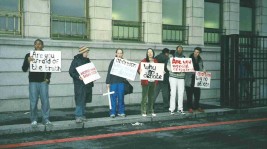WHY IS THIS IMPORTANT NOW?
Europe is currently undergoing its second revolution on the issue of euthanasia/ assisted suicide. The first revolution was in the 1930s and climaxed in the Nazi holocaust.
In South Africa, attempts to legalise it were defeated in 1999. Recently however, a University of the Western Cape lecturer assisted his mother’s suicide in New Zealand and campaigned to legalise euthanasia in South Africa. He was supported by Desmond Tutu, which is not surprising given his opposition to the pro-life position on abortion. They are repeatedly raising the issue in the media. South Africa is in danger of following Europe’s suicidal ethical path as we have already done on ‘same-sex marriage’ and abortion.
Help educate on the Pro-life position
While pro-lifer are aware on the abortion issue, few are prepared to defend our position against complex arguments raised in the euthanasia debate – and don’t have the time to read a book on the subject.
Please use the following short summary on pro-life position to educate your church, your home group on the euthanasia and end of life debate.
THE PRO-LIFE POSITION
* Active killing of an innocent person to relieve suffering is prohibited without any exceptions. Nevertheless complex issues arise relating to when and what medical treatment may be passively withdrawn especially for the terminally ill given advances in medical technology which can prolong life.
Ordinary and extra-ordinary care
* A distinction is made between ‘ordinary care’ and ‘extra-ordinary care’. Ordinary care includes all nursing care such as food, water, warm bedding and medicines that can be easily dispensed. ‘Extra-ordinary care’ includes expensive modern medical apparatus such as heart-lung machines, for which medical care givers have limited resources they must allocate with discretion. Everyone has a right to ‘ordinary care’ and this may not be withdrawn. ‘Extra-ordinary care’ is a relative issue and may be withdrawn.
Who decides when you can’t?
Since the medical circumstances approaching death are complex and sometimes unforeseen and a person may lose consciousness and thus be unable to make medical decisions, they may give a ‘Pro-life Durable health care power of attorney’ document to a trusted pro-life person, usually a family member, to make medical decisions for them should they lose consciousness. Download an example at http://www.rtl.org/action_center/pdfs/DPOA.pdf Such medical decisions must not however include active killing or the withdrawal of ‘ordinary care’.
The alternative of a ‘Living Will’ creates ethical problems because of its inflexibility in the face of unforeseen medical circumstances and varied manner in which the vague wording may be interpreted.
Medicine to relieve pain
* A person who is terminally ill may be given medication to relieve pain which may have the secondary effect of marginally shortening their life, but the intention of the doctor here is not to actively kill.
WHAT DOES THE BIBLE SAY?
The Biblical Christian position is the issue is not simply one of individual rights or public interest, but that all human beings are made in the image of God (Genesis 1:27) and thus have intrinsic value -different to animals or plants – regardless of their medical state, race, disability or usefulness to society. When money is printed onto paper or metal, the image gives it value above that of the raw paper or metal. In the same way, all human beings have value because of being made in the image of God. Thus the rights of God is paramount over the individual or society. Human life is sacred.
Killing of any innocent person is murder and forbidden (Exodus 20:13), even if they are in pain and request death (e.g. 1 Samuel 31). Private citizens may only kill in necessary self defence (Exodus 22:2) and the state only in military or police defence or after due process of law (Deuteronomy 17:6) to find someone guilty of a capital offence (Romans 13:4).
OTHER ETHICAL SYSTEMS
Various other ethical systems in the euthanasia debate have attempted to place the value of human life for example in the intelligence, wantedness, quality of life or the usefulness of the person. Nevertheless all these ethical systems once accepted have started with ‘hard cases’ and progressively lowered the price tag on human life until they end up killing significant numbers of people – sometimes genocide. That is what occurred in the 1930s in Germany after rejection of Christian ethics and is starting to happen again now in Europe, particularly Holland. This marketing of suicide in ‘hard cases’ is argued as an ‘individual choice’ but increasingly, the weak are being pressured to accept euthanasia against their will.
CONCLUSION
We must defend the Sanctity of Life of the weak and vulnerable. If these pro-death ethics are accepted, everyone’s right to life is at risk. Let us fight and defeat this attempt to legalise euthanasia as we did in 1999.
More detailed information on euthanasia in South Africa www.EuthanasiaExposed.co.za


